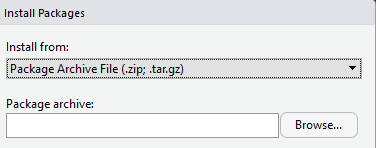Another Update - February 2023
Another package (zipcodeR) has been added that makes this easier. See below.
Answer updated - January 2020
The zipcode package seems to have disappeared, so this answer has been updated to show how to add lat-lon from an external file. New answer at bottom.
Original answer
You can get the data from the zipcode package and just do a merge to look things up.
zip = c("43031", "24517", "43224", "43832", "53022",
"60185", "84104", "43081", "85226", "85193", "54656",
"43215", "94533", "95826", "64804", "49548", "54467")
ZC = data.frame(zip)
library(zipcode)
data(zipcode)
merge(ZC, zipcode)
zip city state latitude longitude
1 24517 Altavista VA 37.12754 -79.27409
2 43031 Johnstown OH 40.15198 -82.66944
3 43081 Westerville OH 40.10951 -82.91606
4 43215 Columbus OH 39.96513 -83.00431
5 43224 Columbus OH 40.03991 -82.96772
6 43832 Newcomerstown OH 40.27738 -81.59662
7 49548 Grand Rapids MI 42.86823 -85.66391
8 53022 Germantown WI 43.21916 -88.12043
9 54467 Plover WI 44.45228 -89.54399
10 54656 Sparta WI 43.96977 -90.80796
11 60185 West Chicago IL 41.89198 -88.20502
12 64804 Joplin MO 37.04716 -94.51124
13 84104 Salt Lake City UT 40.75063 -111.94077
14 85193 Casa Grande AZ 32.86000 -111.83000
15 85226 Chandler AZ 33.31221 -111.93177
16 94533 Fairfield CA 38.26958 -122.03701
17 95826 Sacramento CA 38.55010 -121.37492
If you need to keep the rows in the same order, you can just set the rownames on the zipcode data and use that to select the desired rows and columns.
rownames(zipcode) = zipcode$zip
zipcode[zip, 1:3]
zip city state
43031 43031 Johnstown OH
24517 24517 Altavista VA
43224 43224 Columbus OH
43832 43832 Newcomerstown OH
53022 53022 Germantown WI
60185 60185 West Chicago IL
84104 84104 Salt Lake City UT
43081 43081 Westerville OH
85226 85226 Chandler AZ
85193 85193 Casa Grande AZ
54656 54656 Sparta WI
43215 43215 Columbus OH
94533 94533 Fairfield CA
95826 95826 Sacramento CA
64804 64804 Joplin MO
49548 49548 Grand Rapids MI
54467 54467 Plover WI
Updated Answer - January 2020
Since the zipcode package has disappeared, this shows how to add lat-lon information from a downloaded data set. The file that I am using exists today but the method should work for other files. See the GIS StackExchange for some leads on where to download data.
## Original Data to match
zip = c("43031", "24517", "43224", "43832", "53022",
"60185", "84104", "43081", "85226", "85193", "54656",
"43215", "94533", "95826", "64804", "49548", "54467")
ZC = data.frame(zip)
## Download source file, unzip and extract into table
ZipCodeSourceFile = "http://download.geonames.org/export/zip/US.zip"
temp <- tempfile()
download.file(ZipCodeSourceFile , temp)
ZipCodes <- read.table(unz(temp, "US.txt"), sep="\t")
unlink(temp)
names(ZipCodes) = c("CountryCode", "zip", "PlaceName",
"AdminName1", "AdminCode1", "AdminName2", "AdminCode2",
"AdminName3", "AdminCode3", "latitude", "longitude", "accuracy")
## merge extra info onto original data
fZC_Info = merge(ZC, ZipCodes[,c(2:6,10:11)])
head(ZC_Info)
zip PlaceName AdminName1 AdminCode1 AdminName2 latitude longitude
1 24517 Altavista Virginia VA Campbell 37.1222 -79.2911
2 43031 Johnstown Ohio OH Licking 40.1445 -82.6973
3 43081 Westerville Ohio OH Franklin 40.1146 -82.9105
4 43215 Columbus Ohio OH Franklin 39.9671 -83.0044
5 43224 Columbus Ohio OH Franklin 40.0425 -82.9689
6 43832 Newcomerstown Ohio OH Tuscarawas 40.2739 -81.5940
Second Update - February 2023
Another package, zipcodeR, is now available that makes this easier. Here is some simple code to demonstrate it.
library(zipcodeR)
zip = c("43031", "24517", "43224", "43832", "53022",
"60185", "84104", "43081", "85226", "85193", "54656",
"43215", "94533", "95826", "64804", "49548", "54467")
reverse_zipcode(zip)[,c(1,3,7)]
# A tibble: 17 × 3
zipcode major_city state
<chr> <chr> <chr>
1 85193 Casa Grande AZ
2 85226 Chandler AZ
3 94533 Fairfield CA
4 95826 Sacramento CA
5 60185 West Chicago IL
6 49548 Grand Rapids MI
7 64804 Joplin MO
8 43031 Johnstown OH
9 43081 Westerville OH
10 43215 Columbus OH
11 43224 Columbus OH
12 43832 Newcomerstown OH
13 84104 Salt Lake City UT
14 24517 Altavista VA
15 53022 Germantown WI
16 54467 Plover WI
17 54656 Sparta WI

